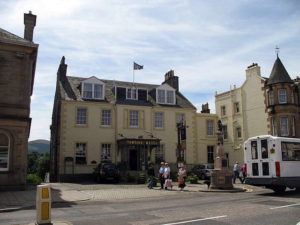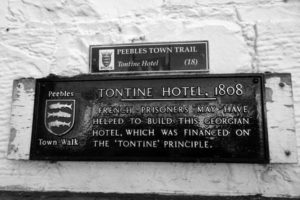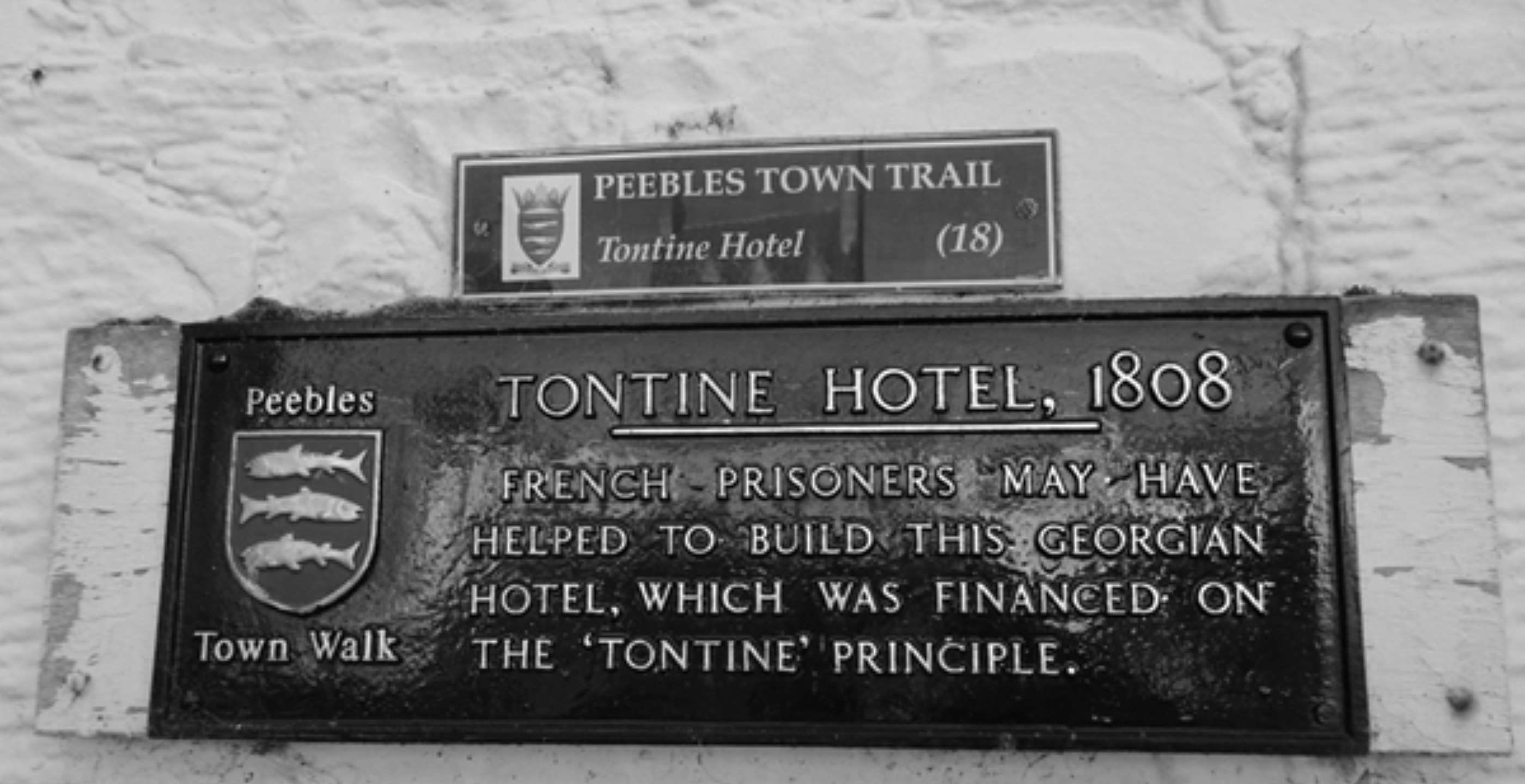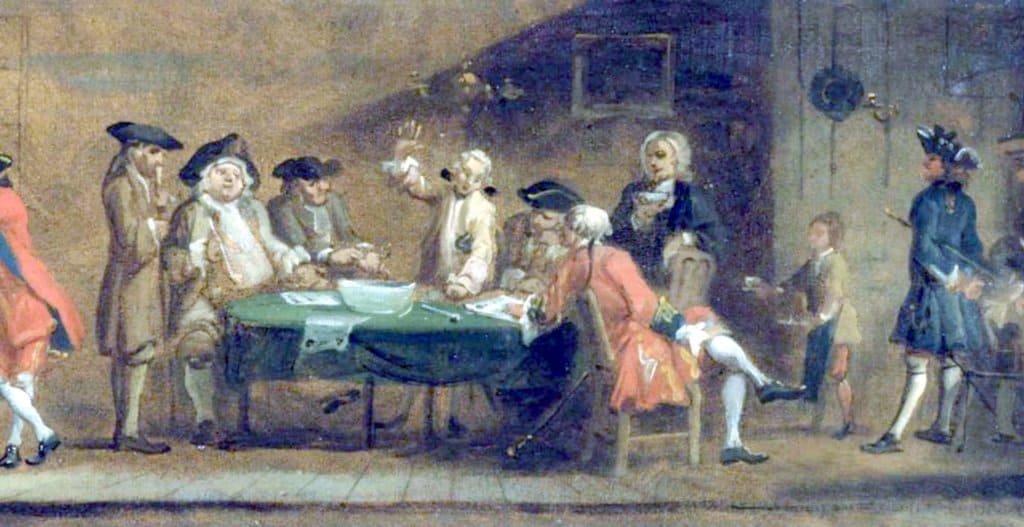What could you do in a Tontine? Well, you could buy a cotton mill, a cutter, or a coal mine. Watch a play or read a book. Sail to New York or catch a stagecoach. But you’d be highly unlikely to find one and get into it today.
In the early 1800s money to build institutions such as libraries and ballrooms was raised privately. Public subscription was one popular method, used for example to finance the building of the Assembly Rooms in Edinburgh. A tontine is another, less well-known alternative.
A quick survey of adverts in British newspapers between 1808 and 1812 revealed 393 references to tontines. In Scotland, tontines were found throughout the country – including Edinburgh, Glasgow, Greenock, Lanark, Leith, Alloa, Aberdeen, Cupar – and Peebles, where the Tontine Hotel is a much-loved institution at the centre of the high street.
 Tontine Hotel, High Street, Peebles. Attribution: Richard Webb. Licensed under the Creative Commons Attribution-Share Alike 2.0 Generic license.
Tontine Hotel, High Street, Peebles. Attribution: Richard Webb. Licensed under the Creative Commons Attribution-Share Alike 2.0 Generic license.
So I was excited to discover that National Records of Scotland (NRS) archives held the minutiae of administration – minutes, inventories, bills, receipts etc.- belonging to Peebles Tontine and stretching from 1803 to 1888. They provide a fascinating insight into the people and the business – and tontines. Three boxes full, in fact.
Peebles Tontine, like all tontines, was funded through an alternative investment plan. known as – guess what – a tontine, devised in the 17th century by an Italian called Tonti.
It worked like this:
• People bought shares in a property. Nothing new there.
• For each share they held, the shareholder named a person, called a ‘nominee’,
• When the nominee died, the shareholder surrendered their share.
• Over time, the shares belonged to fewer people, and these people got higher dividends.
• The shareholder with the longest living nominee got outright ownership of the property. There was no financial benefit to being a nominee. Shareholders could not change their nominees.
Here is an example:
There are 4 shares in a property.
Shareholder Adam owns three shares.
His three nominees are his children Ben, Charlotte and David.
Shareholder Edward owns one share.
His one nominee is his granddaughter Fiona.
Ben, Charlotte and David die of influenza. Fiona outlives them.
Edward therefore becomes the owner of the property.
Who could be a nominee? It depended on the contract. The contract for the Tontine Inn stated that proprietors were “at liberty to enter their own life or that any other person… lives are confined to Great Britain and Ireland…”
The list of original nominees was not found, but the 1840 list shows that nominees were self, friends and family, not people in the public eye. In other examples patriots named members of the royal family.
 The Tontine ballroom today
The Tontine ballroom today
Proprietors could be called upon to prove that their nominee was still alive by producing a certificate signed by a reputable person such as a minister of the church.
While we do not know the identity of all the nominees, we do have the names of all the original 75 shareholders and the number of shares they each held, from the contract. The kind of people buying shares were landed gentry, bankers, merchants. People who wouldn’t miss the odd 25 quid, or £2,000 today, again using RPI equivalence.
75 people owned the 158 shares. 32 of these were members of the Tweeddale Shooting Club, a gentlemen’s club of local landowners and aristocracy, whose members wined and dined copiously at the Tontine. The club still meets at the Tontine. Shareholders included eleven merchants, eight Writers of the Silk (barristers), three bankers, two men of the Cloth, and three women. Many were Edinburgh based.
The nominees had to be living in the British Isles. No doubt the hope was that it would be easier to prove your nominee was still alive if they were in the country. But people have a habit of confounding intentions. During Victoria’s reign we find nominees in far flung outposts of the Empire, and proof of their continuing existence more problematic.

The committee had some difficulty in getting people to name their nominees. How do you decide which person of your acquaintance is likely to live the longest? Some shareholders named themselves, a good way to avoid offending friends and family by not choosing them. The Tontine arrangement is credited with prompting the development of actuarial tables, used to decide the cost of life insurance.
The arrangement had other difficulties. Documents show that proprietors were asked for their money in two installments, and there were some slow payers – very slow payers. Payment for the shares were supposed to be made by Lammas 1807, before building began, but the committee were still chasing payments in 1822 when they finally lost patience and struck at least one name from the list – James Inglis, who owed £37 10s on his two shares. He was in embarrassed circumstances and went to the West Indies, where he died.
The Tontine arrangement is a long-term commitment, and rather like a lottery: you could lose your shares if your nominee died, but you could end up owning an inn if they lived longer than the other nominees. Or rather your estate could: it was to be a rather surprising 80 years before the Peebles Tontine arrangement ended.
But that’s another story.
Sandy is a committed local historian, writer and speaker who lives in Peebles. She shares the town’s affection for the historic inn on its High Street, and has written a book available called ‘The Public Rooms of The County’, the Tontine 1803 – 1892’. Royalties donated to local charities.



